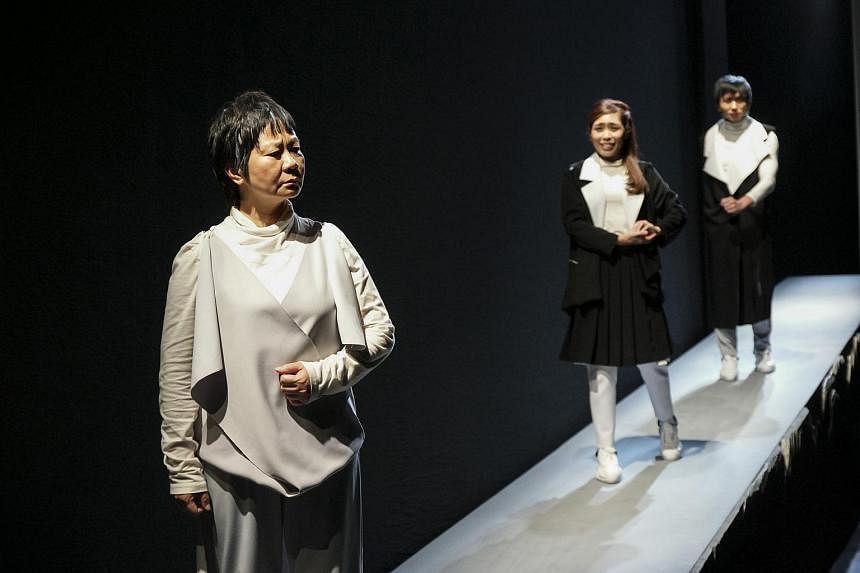Three actors are vying for a part at an audition. They have all prepared their lines, and have tried their best to research the thin material they have been given. But they have a frustratingly opaque director. He sips his coffee, hems and haws, asks them rhetorical questions about the theatre, but doesn't quite seem to have the answers himself.
Toy Factory Productions' Upstage begins on this ambivalent, exploratory note as it walks that thin line between academic exercise, history lesson and theatre performance. An Esplanade commission, it continues the arts centre's long-running tribute to Singapore theatre, which began in March with a sprawling Studios season on 50 English-language plays.
Upstage is a leaner homage to Chinese language theatre in Singapore, but no less ambitious in scope. This time, director Goh Boon Teck and playwright Cheow Boon Seng have used the theatre itself as a frame to look back at the past, drawing from real-life interviews with practitioners and backstage stalwarts, as well as nine significant plays from the past.
It is hard not to draw comparisons with playwright-director Chong Tze Chien's excellent Rant & Rave (2012), a love letter to the Singapore theatre industry told through newspaper clippings and the voices of its practitioners. While that was a breathless gallop through theatre history and the forces that tried to knead it into shape, Upstage feels like its gentler, more meditative sibling, focusing less on the state and the media, and more on the theatre community itself.
The three present-day actors are all struggling to make a living. There is the millennial performer (Jodi Chan), who is trying to decide if theatre is worth the sacrifice, and whose disruptive phonecalls during the rehearsal become a running gag; there is the condescending actor who has had some success (Yeo Kok Siew) and takes himself way too seriously; and then there is the faded veteran (Jalyn Han), trying to get a toehold on the stage once again. They re-enact scenes, mouth off to the director (Lim Ngian Tiong), and sit in puddles of their own existential despair.
These are archetypes painted in broad strokes, but the challenges they face are immediately recognisable, and their hurdles come into stark focus when set against the budding amateur theatre community of the 1960s and 1970s.
Community and communality is a strong thread running through Upstage, which at once laments the loss of that tightknit circle - one where performers gathered in the basement of the Victoria Theatre to cook enormous portions of food for everyone - but also foregrounds the competition that professionalisation brings, with various players jostling for a finite number of scholarships, meaty lead parts and better salaries.
With the help of theatre academic Quah Sy Ren, Upstage re-enacts excerpts from a fascinating selection of plays that highlight the various concerns of theatre and its audiences - and how the perception of Chinese-language artistic practice has evolved from when it was the main language of instruction in a majority of schools, to its gradual erasure by the now predominant English language.
These individual scenes are wonderful to behold. Who would have known that the People's Action Party's Cultural Bureau actually commissioned and produced propaganda-style plays from the 1960s to 1970s? One of them, The Return, sees two siblings exuberantly trying to convince their leftist brother to be a contributing member of a "vibrant" society. "Be a practical and useful man!" they declare, "You don't need to be a hero!"
Other plays bring a burst of nostalgia, such as Kuo Pao Kun's The Little White Sailing Boat (1982), the pinnacle and also the beginning of the end of that strong, heady communal drive that brought groups together.
There is a bittersweetness to the unrelenting tide of history, from which the Chinese title of the play, Bai Du, takes its name - "to ferry across the river", over ceaseless waves and currents. The political inclinations of the earlier years and the blunt melodrama would soon give way to more experimental forms that were still trying to decipher the meaning of identity and belonging - such as Kuo's moving passages from Descendants Of The Eunuch Admiral (1995).
These moments that bring the past to light, while also demonstrating present challenges, are often very insightful.
But there is a point early in the play where one of the actors asks the director if he is directing the production or conducting a history lesson - and it is a question I share. While there is a neat (almost too neat) little twist at the end to justify the director's indecision, it is this nagging ambivalence that seeps into every corner of the play.
I understand the need for a certain open-endedness, allowing the audience to draw their own conclusions. But I think a stronger curatorial hand is needed to tighten those connections between past and present, particularly when the pacing began to flag in the final third of the production and it felt more like a simple laundry list of what theatre groups have done in the last 10 years instead of a carefully-plotted evaluation.
Energy levels were low and the rhythm felt slightly off on the opening night of the show, which also meant that the quartet was never quite functioning as a single entity - even if their characters are operating at different frequencies, the actors themselves should not be.
All the same, we have rarely had a show so exhaustively take stock of this specific sector of the industry, and some of the gems uncovered in this quiet production are a delight to watch.
Black and white photographs and videos are projected on a translucent screen, and there are some lovely moments where these voices and faces are superimposed on the performers as they situate themselves in the narrative of history.
There has been a strong push to document Singapore theatre history this year. Perhaps through these telling us where we are on stage, we might be able to figure out where we are heading off stage.
book it
UPSTAGE
Where: Esplanade Theatre Studio
When: Jun 26 at 8pm, Jun 27 and 28 at 3pm and 8pm
Admission: $30 from Sistic (excludes booking fee; call 6348-5555 or go to www.sistic.com.sg)


